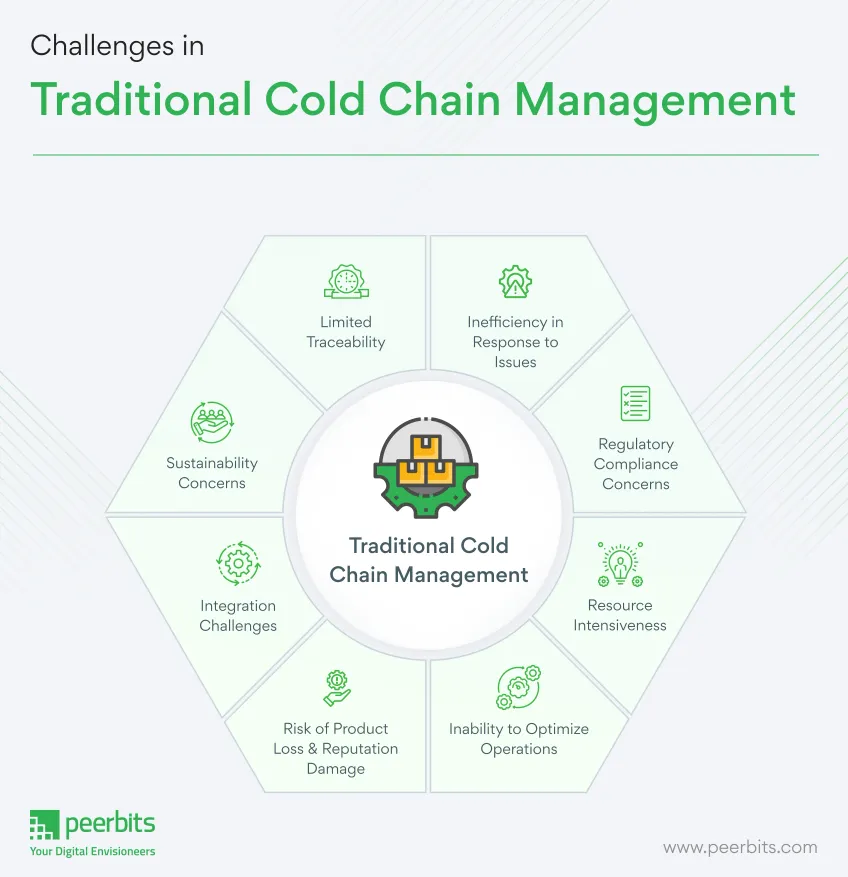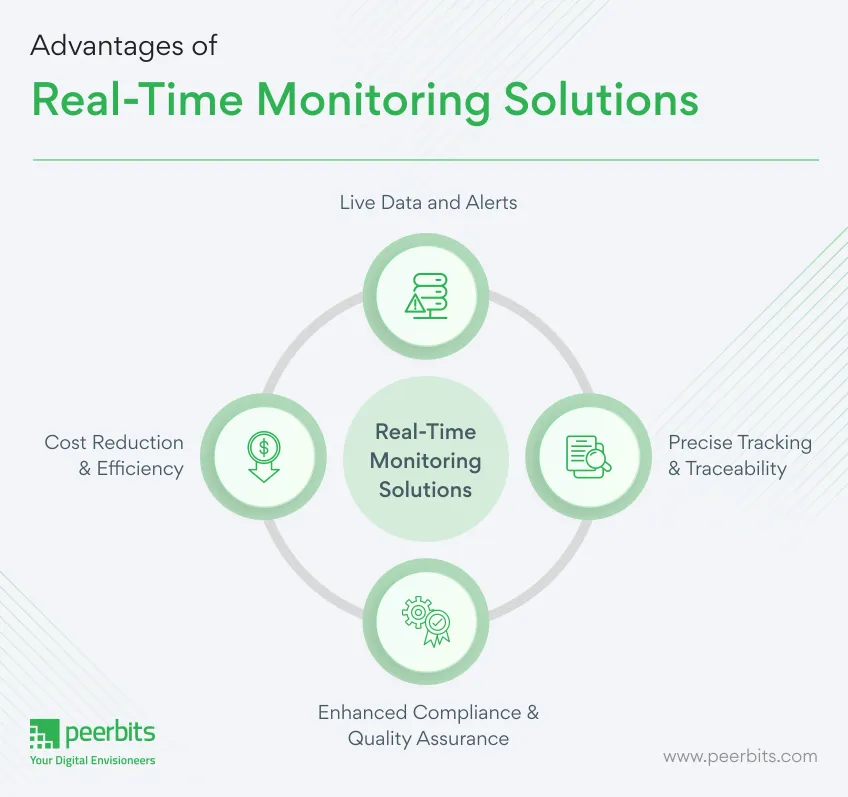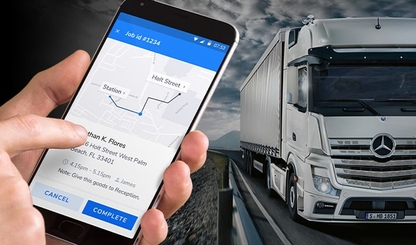Precision and efficiency define the benchmarks for success in the healthcare and logistics sector in today’s competitive times. The management of temperature-sensitive products has become a major concern for most of the business owners. The convergence of technology and logistics app development has birthed a new era in cold chain management, transforming the way healthcare and various industries handle and monitor perishable goods.
Importance of Real-time monitoring solutions
Real-time monitoring solutions are at the forefront of this revolution, offering unprecedented control and visibility over the cold chain, particularly in healthcare and logistics sectors.

Particularly in sectors like healthcare and logistics, these advancements are reshaping the fundamental paradigms of handling and monitoring perishable goods, setting the stage for a transformative era of reliability and assurance.
The transformative power of real-time monitoring solutions lies not merely in their capacity to provide instantaneous data but in their ability to empower proactive intervention. No longer constrained by reactive measures, industries can pre-emptively avert potential risks and disruptions within the cold chain.
The immediacy of alerts and the precision of data analysis create a landscape where mitigation is not a response to crisis but a proactive stance toward ensuring the safety, quality, and efficacy of temperature-sensitive products.
Yet, amid this grand evolution, challenges persist. The cost implications of implementing such cutting-edge solutions, the imperative for standardization across industries, and the burgeoning concerns surrounding data security and privacy necessitate concerted efforts and collaboration among stakeholders.
Only through a united front—forged by technology developers, regulatory bodies, and industries—can the full potential of these innovations be realized, thereby securing a future where the integrity of the cold chain is not a concern but an assured cornerstone of logistics and healthcare landscapes worldwide.
The Importance of Cold Chain Management
The cold chain is the uninterrupted series of storage and distribution activities that maintain a given temperature range for products, particularly those sensitive to temperature fluctuations. Pharmaceuticals, vaccines, perishable foods, and certain chemicals are among the myriad of goods reliant on the integrity of the cold chain for efficacy and safety.
Any deviation from the specified temperature range during storage or transit can compromise the quality, potency, and even safety of these products, leading to financial losses or, more critically, endangering public health.
Furthermore, the importance of cold chain management extends beyond preserving product quality; it plays a pivotal role in global health initiatives and economic stability. In the healthcare sector, vaccines and medicines, especially those for diseases like COVID-19, influenza, or other critical illnesses, heavily rely on an unbroken cold chain to ensure their effectiveness.
Disruptions or failures in maintaining the required temperatures during storage and transportation can jeopardize large-scale vaccination campaigns, impeding disease control efforts and impacting public health outcomes.
Additionally, in the realm of food supply chains, maintaining the cold chain is imperative not only for preserving nutritional value and freshness but also for reducing food waste, ensuring food security, and supporting sustainable agriculture practices globally.
Challenges in Traditional Cold Chain Management
Traditionally, cold chain management relied on periodic checks, manual logging, and passive temperature monitoring tools like data loggers. However, this method had inherent limitations. It lacked real-time visibility, making it difficult to detect temperature excursions promptly. Moreover, manual recording was prone to human error and offered little insight into the conditions the products faced during transit.
Here are some additional challenges associated with traditional cold chain management:

Limited Traceability
Traditional methods often lacked comprehensive traceability. They couldn't provide detailed insights into the journey of each product within the cold chain. This limitation made it challenging to pinpoint the exact cause of any temperature deviations or spoilage incidents.
Inefficiency in Response to Issues
Due to the lack of real-time data and immediate notifications about temperature excursions, addressing problems in the cold chain was often reactive rather than proactive. This meant that corrective actions were taken after the damage was done, impacting product quality and potentially leading to significant losses.
Regulatory Compliance Concerns
Meeting stringent regulatory requirements regarding temperature control and product integrity became more challenging without accurate and detailed data. Traditional methods often struggled to provide the level of documentation necessary to meet compliance standards.
Resource Intensiveness
Manual monitoring and periodic checks consumed substantial human resources and time. As the supply chains grew more complex, managing these tasks across various stages of the cold chain became increasingly labor-intensive and costly.
Inability to Optimize Operations
Traditional cold chain methods lacked the ability to analyze data comprehensively. Without robust analytics, it was challenging to identify trends, optimize routes, or improve processes for more efficient operations.
Risk of Product Loss and Reputation Damage
Inaccurate monitoring and delays in detecting temperature excursions increased the risk of product spoilage or compromise. This not only resulted in financial losses but also damaged the reputation of companies due to compromised product quality.
Integration Challenges
Integrating traditional monitoring systems with modern technologies or newer infrastructure often posed compatibility and data synchronization challenges. This hindered the seamless flow of information across the supply chain.
Sustainability Concerns
Manual logging and periodic checks contribute to higher paper usage and inefficiencies, impacting the sustainability goals of companies striving for environmentally friendly practices within their operations.
How to address these challenges?
Addressing these challenges has been a key focus for the industry, leading to the adoption of more advanced technologies and integrated systems that offer real-time monitoring, analytics-driven insights, and automated alerts to ensure the integrity of the cold chain.
Real-Time Monitoring Solutions
Advancements in Internet of Things (IoT) and sensor technologies have paved the way for real-time monitoring solutions that revolutionize cold chain management. These solutions incorporate a network of sensors, often wireless, embedded within the packaging or the environment, continuously collecting and transmitting data to a centralized platform.
Benefits of Real-Time Monitoring Solutions
Access unparalleled advantages with Real-Time Monitoring Solutions, transforming industries with heightened efficiency and precision. Experience proactive insights and enhanced decision-making for optimized operations and unparalleled quality control.

Live Data and Alerts
Real-time monitoring provides instant visibility into temperature, humidity, location, and other crucial parameters. Any deviations trigger immediate alerts, allowing swift interventions to mitigate risks.
Precise Tracking and Traceability
With GPS integration, these solutions enable precise tracking throughout the entire supply chain, ensuring accountability and facilitating traceability in case of issues.
Enhanced Compliance and Quality Assurance
Automated data collection and logging improve compliance with regulations, ensuring adherence to specified storage conditions. This, in turn, bolsters quality assurance and product efficacy.
Cost Reduction and Efficiency
Proactive monitoring minimizes product loss and waste, reducing financial burdens while optimizing logistics and operational efficiency.
Application in Healthcare and Logistics
In the healthcare sector, real-time monitoring solutions have become indispensable, especially for vaccines and pharmaceuticals that demand stringent temperature controls. Logistics companies handling perishable goods, from food to sensitive electronic components, also benefit significantly from these advancements.
For instance, supermarkets can ensure the freshness of produce, and electronics manufacturers can safeguard their components during transit.
Future Trends and Challenges
As technology evolves, real-time monitoring solutions continue to evolve, incorporating AI-driven analytics for predictive maintenance and risk mitigation. However, challenges persist, such as the cost of implementation, standardization of systems across industries, and cybersecurity concerns regarding data integrity and privacy.
Conclusion
Real-time monitoring solutions are redefining cold chain management, offering a paradigm shift from reactive to proactive approaches. The ability to monitor, analyze, and act upon real-time data empowers industries, particularly logistics and healthcare app development, to ensure the integrity of temperature-sensitive products, thereby enhancing safety, quality, and efficiency across the supply chain.
As we embrace the potential of these innovations, collaboration between technology providers, regulators, and industries will be pivotal in driving the adoption of these solutions, ushering in an era where the integrity of the cold chain is no longer a concern but an assured aspect of the logistics landscape.
In conclusion, the evolution of real-time monitoring solutions marks a pivotal moment in the history of cold chain management. Their integration into healthcare and logistics sectors represents a monumental stride toward ensuring product integrity, safety, and efficacy. With live data insights and immediate alerts, industries can proactively safeguard temperature-sensitive goods, mitigating risks and preserving quality throughout the supply chain.







